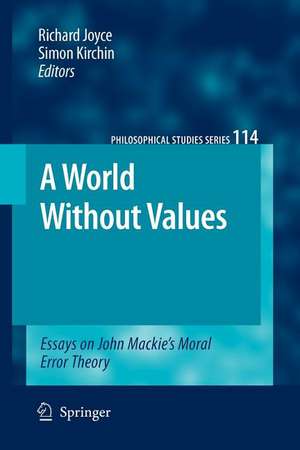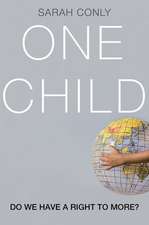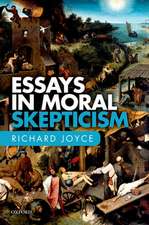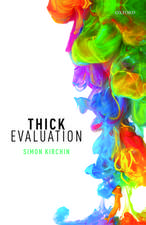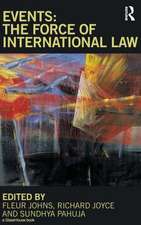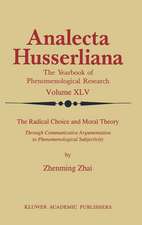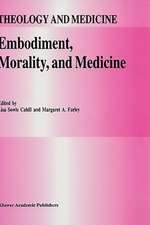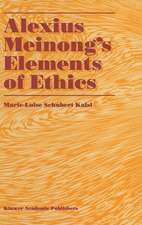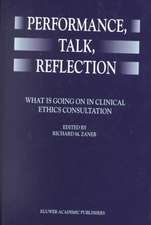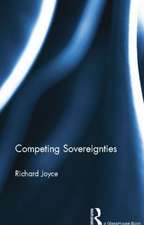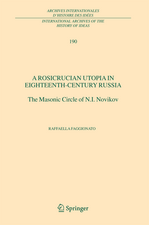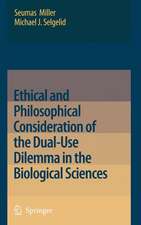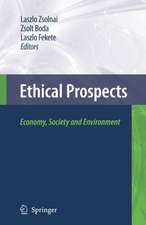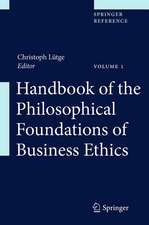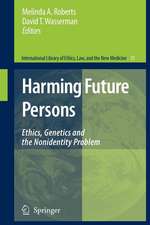A World Without Values: Essays on John Mackie's Moral Error Theory: Philosophical Studies Series, cartea 114
Editat de Richard Joyce, Simon Kirchinen Limba Engleză Paperback – 14 mar 2012
Taking as its point of departure the work of moral philosopher John Mackie (1917-1981), A World Without Values is a collection of essays on moral skepticism by leading contemporary philosophers, some of whom are sympathetic to Mackie’s views, some of whom are opposed. Rather than treating moral skepticism as something to dismiss as quickly as possible, this anthology is a comprehensive exploration of the topic, and as such will be a valuable resource for students of moral philosophy at all levels, as well as professionals in the field of meta-ethics. A World Without Values presents state-of-the-art arguments that advance the ongoing philosophical debate on several fronts, and will enjoy an important place on any meta-ethicist’s bookshelf for some years to come.
| Toate formatele și edițiile | Preț | Express |
|---|---|---|
| Paperback (1) | 638.76 lei 6-8 săpt. | |
| SPRINGER NETHERLANDS – 14 mar 2012 | 638.76 lei 6-8 săpt. | |
| Hardback (1) | 644.95 lei 6-8 săpt. | |
| SPRINGER NETHERLANDS – 10 dec 2009 | 644.95 lei 6-8 săpt. |
Din seria Philosophical Studies Series
-
 Preț: 407.78 lei
Preț: 407.78 lei - 15%
 Preț: 644.95 lei
Preț: 644.95 lei - 18%
 Preț: 1120.18 lei
Preț: 1120.18 lei - 18%
 Preț: 1005.43 lei
Preț: 1005.43 lei - 15%
 Preț: 640.06 lei
Preț: 640.06 lei -
 Preț: 381.21 lei
Preț: 381.21 lei -
 Preț: 391.61 lei
Preț: 391.61 lei - 15%
 Preț: 640.88 lei
Preț: 640.88 lei - 15%
 Preț: 639.25 lei
Preț: 639.25 lei - 18%
 Preț: 1221.51 lei
Preț: 1221.51 lei - 18%
 Preț: 947.18 lei
Preț: 947.18 lei - 18%
 Preț: 955.56 lei
Preț: 955.56 lei - 18%
 Preț: 950.96 lei
Preț: 950.96 lei - 15%
 Preț: 645.47 lei
Preț: 645.47 lei - 15%
 Preț: 635.79 lei
Preț: 635.79 lei - 15%
 Preț: 644.82 lei
Preț: 644.82 lei - 18%
 Preț: 950.66 lei
Preț: 950.66 lei -
 Preț: 386.00 lei
Preț: 386.00 lei - 15%
 Preț: 644.82 lei
Preț: 644.82 lei - 15%
 Preț: 642.18 lei
Preț: 642.18 lei - 15%
 Preț: 643.48 lei
Preț: 643.48 lei - 18%
 Preț: 944.99 lei
Preț: 944.99 lei - 20%
 Preț: 553.25 lei
Preț: 553.25 lei - 20%
 Preț: 560.30 lei
Preț: 560.30 lei - 18%
 Preț: 951.29 lei
Preț: 951.29 lei - 18%
 Preț: 893.40 lei
Preț: 893.40 lei - 20%
 Preț: 566.75 lei
Preț: 566.75 lei - 18%
 Preț: 951.77 lei
Preț: 951.77 lei
Preț: 638.76 lei
Preț vechi: 751.47 lei
-15% Nou
Puncte Express: 958
Preț estimativ în valută:
122.23€ • 127.36$ • 101.20£
122.23€ • 127.36$ • 101.20£
Carte tipărită la comandă
Livrare economică 03-17 aprilie
Preluare comenzi: 021 569.72.76
Specificații
ISBN-13: 9789400730991
ISBN-10: 9400730993
Pagini: 264
Ilustrații: XXIV, 238 p.
Dimensiuni: 155 x 235 x 14 mm
Greutate: 0.37 kg
Ediția:2010
Editura: SPRINGER NETHERLANDS
Colecția Springer
Seria Philosophical Studies Series
Locul publicării:Dordrecht, Netherlands
ISBN-10: 9400730993
Pagini: 264
Ilustrații: XXIV, 238 p.
Dimensiuni: 155 x 235 x 14 mm
Greutate: 0.37 kg
Ediția:2010
Editura: SPRINGER NETHERLANDS
Colecția Springer
Seria Philosophical Studies Series
Locul publicării:Dordrecht, Netherlands
Public țintă
ResearchCuprins
Against Ethics.- Nihilism, Nietzsche, and the Doppelganger Problem.- Patterns of Objectification.- Mackie's Internalisms.- Mackie's Realism: Queer Pigs and the Web of Belief.- Mackie on Practical Reason.- The Argument from Moral Experience.- Beyond the Error Theory.- Normativity, Deliberation, and Queerness.- A Tension in the Moral Error Theory.- Business as Usual? The Error Theory, Internalism, and the Function of Morality.- The Fictionalist's Attitude Problem.- Abolishing Morality.
Recenzii
From the reviews:
"A World without Values contains some of the best contemporary evaluations to date both of Mackie's error theory and of its wider philosophical significance. It is also the first multi-authored work on this scale devoted exclusively to this topic. As such, it is a significant event." Hallvard Lillehammer (Cambridge University) in Notre Dame Philosophical Reviews, July 2010
“Chapter provides a good explanation of Mackie’s moral error theory. … Overall, this volume will be excellent reading for those interested in the strengths and weaknesses of Mackie’s moral error theory in particular, or in the metaethical debate between moral realists and anti-realists more generally.” (Diego E. Machuca, Philosophy in Review, Vol. XXXI (5), 2011)
"A World without Values contains some of the best contemporary evaluations to date both of Mackie's error theory and of its wider philosophical significance. It is also the first multi-authored work on this scale devoted exclusively to this topic. As such, it is a significant event." Hallvard Lillehammer (Cambridge University) in Notre Dame Philosophical Reviews, July 2010
“Chapter provides a good explanation of Mackie’s moral error theory. … Overall, this volume will be excellent reading for those interested in the strengths and weaknesses of Mackie’s moral error theory in particular, or in the metaethical debate between moral realists and anti-realists more generally.” (Diego E. Machuca, Philosophy in Review, Vol. XXXI (5), 2011)
Notă biografică
Richard Joyce is an Associate Professor of Philosophy at the University of Sydney. He received his PhD from Princeton University in 1998, after which he was a lecturer at the University of Sheffield. He is the author of "The Myth of Morality" (Cambridge University Press, 2001) and "The Evolution of Morality" (MIT Press, 2006).
Simon Kirchn is Senior Lecturer in Philosophy at the University of Kent. He received his PhD from the University of Sheffield and subsequently taught at the University of Bristol. He is the author of a number of papers in metaethics and the co-editor (with Andrew Fisher) of Arguing About Metaethics (2006). He is currently writing a book on thick concepts. He was elected President of the British Society of Ethical Theory in 2008 and is an Assistant Editor of Ethical Theory and Moral Practice.
Simon Kirchn is Senior Lecturer in Philosophy at the University of Kent. He received his PhD from the University of Sheffield and subsequently taught at the University of Bristol. He is the author of a number of papers in metaethics and the co-editor (with Andrew Fisher) of Arguing About Metaethics (2006). He is currently writing a book on thick concepts. He was elected President of the British Society of Ethical Theory in 2008 and is an Assistant Editor of Ethical Theory and Moral Practice.
Textul de pe ultima copertă
For centuries, certain moral philosophers have maintained that morality is an illusion, comparable to talking of ghosts or unicorns. These moral skeptics claim that the world simply doesn’t contain the sort of properties (such as moral badness, moral obligation, etc.) necessary to render moral statements true. Even seemingly obvious moral claims, such as "killing innocents is morally wrong" fail to be true. What would lead someone to adopt such a radical viewpoint? Are the arguments in its favor defensible or plausible? What impact would embracing such a view have on one’s practical life?
Taking as its point of departure the work of moral philosopher John Mackie (1917-1981), A World Without Values is a collection of essays on moral skepticism by leading contemporary philosophers, some of whom are sympathetic to Mackie’s views, some of whom are opposed. Rather than treating moral skepticism as something to dismiss as quickly as possible, this anthology is a comprehensive exploration of the topic, and as such will be a valuable resource for students of moral philosophy at all levels, as well as professionals in the field of meta-ethics. A World Without Values presents state-of-the-art arguments that advance the ongoing philosophical debate on several fronts, and will enjoy an important place on any meta-ethicist’s bookshelf for some years to come.
Taking as its point of departure the work of moral philosopher John Mackie (1917-1981), A World Without Values is a collection of essays on moral skepticism by leading contemporary philosophers, some of whom are sympathetic to Mackie’s views, some of whom are opposed. Rather than treating moral skepticism as something to dismiss as quickly as possible, this anthology is a comprehensive exploration of the topic, and as such will be a valuable resource for students of moral philosophy at all levels, as well as professionals in the field of meta-ethics. A World Without Values presents state-of-the-art arguments that advance the ongoing philosophical debate on several fronts, and will enjoy an important place on any meta-ethicist’s bookshelf for some years to come.
Caracteristici
The long needed, up-to-date book on Mackie's error theory reflecting the latest views and accounts in the field The only book on the market to focus comprehensively on the topic of moral skepticism Mackie's error theory revisited by leading scholars in the field Covers direct descendants of Mackie's error theory such as moral fictionalism With a long and accessible Introduction to situate readers in the complex discussion
